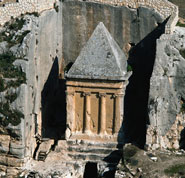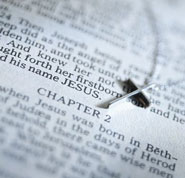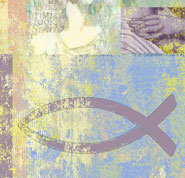It is the history of the Bible that makes it unique among 'sacred texts.' See who wrote the Bible, how it's reportive style is backed by archeology and historians...
History of the Bible - Who wrote the Bible?
 The Bible was written over a span of 1500 years, by 40 writers. Unlike other religious writings, the Bible reads as a factual news account of real events, places, people, and dialogue. Historians and archaeologists have repeatedly confirmed its authenticity.
The Bible was written over a span of 1500 years, by 40 writers. Unlike other religious writings, the Bible reads as a factual news account of real events, places, people, and dialogue. Historians and archaeologists have repeatedly confirmed its authenticity.
Using the writers' own writing styles and personalities, God shows us who he is and what it's like to know him.
There is one central message consistently carried by all 40 writers of the Bible: God, who created us all, desires a relationship with us. He calls us to know him and trust him.
The Bible not only inspires us, it explains life and God to us. It does not answer all the questions we might have, but enough of them. It shows us how to live with purpose and compassion. How to relate to others. It encourages us to rely on God for strength, direction, and enjoy his love for us. The Bible also tells us how we can have eternal life.
Multiple categories of evidence support the historical accuracy of the Bible as well as its claim to divine authorship. (Here are the subsections of this article, if you want to jump to any particular one.)
- How does archaeology support the Bible?
- Has the Bible changed over time, or do we have what was originally written?
- Are the gospel accounts of Jesus reliable?
- Do historians confirm what the Bible says about Jesus?
- Are there contradictions in the Bible?
- How were the books of the New Testament determined? Why not the gospel of Judas?
- Why did it take 30 to 60 years for the Gospels to be written?
- Does it matter if Jesus really did and said what is in the Gospels?
1. How does archaeology support the Bible?
 Archaeology cannot prove that the Bible is God's written word to us. However, archaeology can (and does) substantiate the Bible's historical accuracy. Archaeologists have consistently discovered the names of government officials, kings, cities, and festivals mentioned in the Bible -- sometimes when historians didn't think such people or places existed. For example, the Gospel of John tells of Jesus healing a cripple next to the Pool of Bethesda. The text even describes the five porticoes (walkways) leading to the pool. Scholars didn't think the pool existed, until archaeologists found it forty feet below ground, complete with the five porticoes.1
Archaeology cannot prove that the Bible is God's written word to us. However, archaeology can (and does) substantiate the Bible's historical accuracy. Archaeologists have consistently discovered the names of government officials, kings, cities, and festivals mentioned in the Bible -- sometimes when historians didn't think such people or places existed. For example, the Gospel of John tells of Jesus healing a cripple next to the Pool of Bethesda. The text even describes the five porticoes (walkways) leading to the pool. Scholars didn't think the pool existed, until archaeologists found it forty feet below ground, complete with the five porticoes.1
The Bible has a tremendous amount of historical detail, so not everything mentioned in it has yet been found through archaeology. However, not one archaeological find has conflicted with what the Bible records.2
In contrast, news reporter Lee Strobel comments about the Book of Mormon: "Archaeology has repeatedly failed to substantiate its claims about events that supposedly occurred long ago in the Americas. I remember writing to the Smithsonian Institute to inquire about whether there was any evidence supporting the claims of Mormonism, only to be told in unequivocal terms that its archaeologists see 'no direct connection between the archaeology of the New World and the subject matter of the book.'" Archaeologists have never located cities, persons, names, or places mentioned in the Book of Mormon.3
Many of the ancient locations mentioned by Luke, in the Book of Acts in the New Testament, have been identified through archaeology. "In all, Luke names thirty-two countries, fifty-four cities and nine islands without an error."4
Archaeology has also refuted many ill-founded theories about the Bible. For example, a theory still taught in some colleges today asserts that Moses could not have written the Pentateuch (the first five books of the Bible), because writing had not been invented in his day. Then archaeologists discovered the Black Stele. "It had wedge-shaped characters on it and contained the detailed laws of Hammurabi. Was it post-Moses? No! It was pre-Mosaic; not only that, but it was pre-Abraham (2,000 B.C.). It preceded Moses' writings by at least three centuries."5
Archaeology consistently confirms the historical accuracy of the Bible.
For further study, click here to see a chart listing some of the major archaeological finds.
2. Has the Bible changed over time, or do we have what was originally written?
 Some people have the idea that the Bible has been translated "so many times" that it has become corrupted through stages of translating. If the translations were being made from other translations, they would have a case. But translations are actually made directly from original Greek, Hebrew and Aramaic source texts based on thousands of ancient manuscripts.
Some people have the idea that the Bible has been translated "so many times" that it has become corrupted through stages of translating. If the translations were being made from other translations, they would have a case. But translations are actually made directly from original Greek, Hebrew and Aramaic source texts based on thousands of ancient manuscripts.
The Old Testament's accuracy was confirmed by an archaeological discovery in 1947, along today's West Bank in Israel. "The Dead Sea Scrolls" contained Old Testament scripture dating 1,000 years older than any manuscripts we had. When comparing the manuscripts at hand with these, from 1,000 years earlier, we find agreement 99.5% of the time. And the .5% differences are minor spelling variances and sentence structure that doesn't change the meaning of the sentence.
Regarding the New Testament, it is humanity's most reliable ancient document. We have thousands of copies of the New Testament, all dated closely to the original writing. In fact, we are more sure the New Testament remains as it was originally written by its writers, than we are sure of writings we attribute to Plato, or Aristotle, or Homer's Iliad. For a comparison of the New Testament to other ancient writings, click here.
3. Are the gospel accounts of Jesus reliable?
 Four of the writers of the New Testament each wrote their own biography on the life of Jesus. These are called the four gospels, the first four books of the New Testament. How can we be sure these biographies of Jesus are accurate?
Four of the writers of the New Testament each wrote their own biography on the life of Jesus. These are called the four gospels, the first four books of the New Testament. How can we be sure these biographies of Jesus are accurate?
When historians try to determine if a biography is reliable, they ask, "How many other sources report the same details about this person?" Here's how this works. Imagine you are collecting biographies of President John F. Kennedy. You find many describing his family, his presidency, his handling of the Cuban Missile Crisis, and almost all of the biographies report similar facts. But what if you found one biography reporting that he lived ten years as a priest in South Africa? The other biographies show he lived in the U.S. his entire life. A sensible historian would go with the accounts that agree with one another.
Regarding Jesus, do we find multiple biographies reporting similar facts about his life? Yes. Here is a sampling of facts about Jesus, and where you would find that fact reported in each of their biographies.
| Matthew | Mark | Luke | John | |
| Jesus was born of a virgin | 1:18-25 | - | 1:27, 34 | - |
| He was born in Bethlehem | 2:1 | - | 2:4 | - |
| He lived in Nazareth | 2:23 | 1:9, 24 | 2:51, 4:16 | 1:45, 46 |
| Jesus was baptized by John the Baptist | 3:1-15 | 1:4-9 | 3:1-22 | - |
| He performed miracles of healing | 4:24, etc. | 1:34, etc. | 4:40, etc. | 9:7 |
| He walked on water | 14:25 | 6:48 | - | 6:19 |
| He fed five thousand people with five loaves and two fish | 14:7 | 6:38 | 9:13 | 6:9 |
| Jesus taught the common people | 5:1 | 4:25, 7:28 | 9:11 | 18:20 |
| He spent time with social outcasts | 9:10, 21:31 | 2:15, 16 | 5:29, 7:29 | 8:3 |
| He argued with the religious elite | 15:7 | 7:6 | 12:56 | 8:1-58 |
| The religious elite plotted to kill him | 12:14 | 3:6 | 19:47 | 11:45-57 |
| They handed Jesus over to the Romans | 27:1, 2 | 15:1 | 23:1 | 18:28 |
| Jesus was flogged | 27:26 | 15:15 | - | 19:1 |
| He was crucified | 27:26-50 | 15:22-37 | 23:33-46 | 19:16-30 |
| He was buried in a tomb | 27:57-61 | 15:43-47 | 23:50-55 | 19:38-42 |
| Jesus rose from the dead and appeared to his followers | 28:1-20 | 16:1-20 | 24:1-53 | 20:1-31 |
Two of the gospel biographies were written by the apostles Matthew and John, men who knew Jesus personally and traveled with him for over three years. The other two books were written by Mark and Luke, close associates of the apostles. These writers had direct access to the facts they were recording. The early church accepted the four gospels because they agreed with what was already common knowledge about Jesus' life.
Again, the gospels read like news reports, a factual accounting of the days events, each from their own perspective. The descriptions are unique to each writer, but the facts are in agreement. The gospels give specific geographical names and cultural details that have been confirmed by historians and archaeologists.
4. Do historians confirm what the Bible says about Jesus?
 The Bible reports that Jesus of Nazareth performed many miracles, was executed by the Romans, and rose from the dead. Numerous ancient historians corroborate the Bible's account of the life of Jesus and his followers:
The Bible reports that Jesus of Nazareth performed many miracles, was executed by the Romans, and rose from the dead. Numerous ancient historians corroborate the Bible's account of the life of Jesus and his followers:
Cornelius Tacitus (A.D. 55-120), an historian of first-century Rome, is considered one of the most accurate historians of the ancient world.6An excerpt from Tacitus tells us that the Roman emperor Nero "inflicted the most exquisite tortures on a class...called Christians. ...Christus [Christ], from whom the name had its origin, suffered the extreme penalty during the reign of Tiberius at the hands of one of our procurators, Pontius Pilatus...."7
Flavius Josephus, a Jewish historian (A.D. 38-100), wrote about Jesus in hisJewish Antiquities. From Josephus, "we learn that Jesus was a wise man who did surprising feats, taught many, won over followers from among Jews and Greeks, was believed to be the Messiah, was accused by the Jewish leaders, was condemned to be crucified by Pilate, and was considered to be resurrected."8
Suetonius, Pliny the Younger, and Thallus also wrote about Christian worship and persecution that is consistent with New Testament accounts.
Even the Jewish Talmud, certainly not biased toward Jesus, concurs about the major events of his life. From the Talmud, "we learn that Jesus was conceived out of wedlock, gathered disciples, made blasphemous claims about himself, and worked miracles, but these miracles are attributed to sorcery and not to God."9
This is remarkable information considering that most ancient historians focused on political and military leaders, not on obscure rabbis from distant provinces of the Roman Empire. Yet ancient historians (Jews, Greeks and Romans) confirm the major events that are presented in the New Testament, even though they were not believers themselves.
5. Are there contradictions in the Bible?
 While some claim that the Bible is full of contradictions, this simply isn't true. The number of apparent contradictions is actually remarkably small for a book of the Bible's size and scope. What apparent discrepancies do exist are more curiosity than calamity. They do not touch on any major event or article of faith.
While some claim that the Bible is full of contradictions, this simply isn't true. The number of apparent contradictions is actually remarkably small for a book of the Bible's size and scope. What apparent discrepancies do exist are more curiosity than calamity. They do not touch on any major event or article of faith.
Here is an example of a so-called contradiction. Pilate ordered that a sign be posted on the cross where Jesus hung. Three of the Gospels record what was written on that sign:
In Matthew: "This is Jesus, the king of the Jews."
In Mark: "The king of the Jews."
In John: "Jesus of Nazareth, the king of the Jews."
In Matthew: "This is Jesus, the king of the Jews."
In Mark: "The king of the Jews."
In John: "Jesus of Nazareth, the king of the Jews."
The wording is different, hence the apparent contradiction. The remarkable thing, though, is that all three writers describe the same event in such detail -- Jesus was crucified. On this they all agree. They even record that a sign was posted on the cross, and the meaning of the sign is the same in all three accounts!
What about the exact wording? In the original Greek of the Gospels, they didn't use a quotation symbol as we do today to indicate a direct quote. The Gospel writers were making an indirect quote, which would account for the subtle differences in the passages.
Here is another example of an apparent contradiction. Was Jesus two nights in the tomb or three nights in the tomb before His resurrection? Jesus said, prior to his crucifixion, "For as Jonah was three days and three nights in the belly of a huge fish, so the Son of Man will be three days and three nights in the heart of the earth" (Matthew 12:40). Mark records another statement that Jesus made, "We are going up to Jerusalem, and the Son of Man will be betrayed to the chief priests and teachers of the law. They will condemn him to death and will hand him over to the Gentiles, who will mock him and spit on him, flog him and kill him. Three days later he will rise." (Mark 10:33,34)
Jesus was killed on Friday and the resurrection was discovered on Sunday. How can that be three days and nights in the tomb? It was a Jewish figure of speech in Jesus' time to count any part of a day or night as a full day and night. So Friday, Saturday, and Sunday would be called three days and three nights in Jesus' culture. We speak in similar ways today -- if a person were to say, "I spent all day shopping," we understand that the person didn't mean 24 hours.
This is typical of apparent contradictions in the New Testament. Most are resolved by a closer examination of the text itself or through studying the historical background.
6. How were the books of the New Testament determined? Why not accept the apocrypha, the gospel of Judas, or the gospel of Thomas?
 There are solid reasons for trusting in today's list of New Testament books. The church accepted the New Testament books almost as soon as they were written. The writers were friends of Jesus or his immediate followers, men to whom Jesus had entrusted the leadership of the early church. The Gospel writers Matthew and John were some of Jesus' closest followers. Mark and Luke were companions of the apostles, having access to the apostles' account of Jesus' life.
There are solid reasons for trusting in today's list of New Testament books. The church accepted the New Testament books almost as soon as they were written. The writers were friends of Jesus or his immediate followers, men to whom Jesus had entrusted the leadership of the early church. The Gospel writers Matthew and John were some of Jesus' closest followers. Mark and Luke were companions of the apostles, having access to the apostles' account of Jesus' life.
The other New Testament writers had immediate access to Jesus as well: James and Jude were half-brothers of Jesus who initially did not believe in him. Peter was one of the 12 apostles. Paul started out as a violent opponent of Christianity and a member of the religious ruling class, but he became an ardent follower of Jesus, convinced that Jesus rose from the dead.
The reports in the New Testament books lined up with what thousands of eyewitnesses had seen for themselves. When other books were written hundreds of years later, it wasn't difficult for the church to spot them as forgeries. For example, the Gospel of Judas was written by the Gnostic sect, around 130-170 A.D., long after Judas' death. The Gospel of Thomas, written around 140 A.D., is another example of a counterfeit writing erroneously bearing an apostles' name. These and other Gnostic gospels conflicted with the known teachings of Jesus and the Old Testament, and often contained numerous historical and geographical errors.10
In A.D. 367, Athanasius formally listed the 27 New Testament books (the same list that we have today). Soon after, Jerome and Augustine circulated this same list. These lists, however, were not necessary for the majority of Christians. By and large the whole church had recognized and used the same list of books since the first century after Christ. As the church grew beyond the Greek-speaking lands and needed to translate the Scriptures, and as splinter sects continued to pop up with their own competing holy books, it became more important to have a definitive list.
7. Why did it take 30 to 60 years for the New Testament Gospels to be written?
 The main reason the Gospel accounts were not written immediately after Jesus' death and resurrection is that there was no apparent need for any such writings. Initially the gospel spread by word of mouth in Jerusalem. There was no need to compose a written account of Jesus' life, because those in the Jerusalem region were witnesses of Jesus and well aware of his ministry.11
The main reason the Gospel accounts were not written immediately after Jesus' death and resurrection is that there was no apparent need for any such writings. Initially the gospel spread by word of mouth in Jerusalem. There was no need to compose a written account of Jesus' life, because those in the Jerusalem region were witnesses of Jesus and well aware of his ministry.11
However, when the gospel spread beyond Jerusalem, and the eyewitnesses were no longer readily accessible, there was a need for written accounts to educate others about Jesus' life and ministry. Many scholars date the writing of the Gospels between 30 and 60 years after Jesus' death.
Luke, at the beginning of his gospel, tells us why he wrote it: "Many have undertaken to draw up an account of the things that have been fulfilled among us, just as they were handed down to us by those who from the first were eyewitnesses and servants of the word. Therefore, since I myself have carefully investigated everything from the beginning, it seemed good to me to write an orderly account for you, most excellent Theophilus, so that you may have certainty of the things you have been taught.12
Have you ever read anything from the New Testament Gospels? To read a sample from the Gospel of John, click here.
If you would like to know more about Jesus, this article will give you a good summary of his life: Beyond Blind Faith.
8. Does it matter if Jesus really did and said what is in the Gospels?
 Yes. For faith to really be of any value, it must be based on facts, on reality. Here is why. If you were taking a flight to London, you would probably have faith that the jet is fueled and mechanically reliable, the pilot trained, and no terrorists on board. Your faith, however, is not what gets you to London. Your faith is useful in that it got you on the plane. But what actually gets you to London is the integrity of the plane, pilot, etc. You could rely on your positive experience of past flights. But your positive experience would not be enough to get that plane to London. What matters is the object of your faith -- is it reliable?
Yes. For faith to really be of any value, it must be based on facts, on reality. Here is why. If you were taking a flight to London, you would probably have faith that the jet is fueled and mechanically reliable, the pilot trained, and no terrorists on board. Your faith, however, is not what gets you to London. Your faith is useful in that it got you on the plane. But what actually gets you to London is the integrity of the plane, pilot, etc. You could rely on your positive experience of past flights. But your positive experience would not be enough to get that plane to London. What matters is the object of your faith -- is it reliable?
Is the New Testament an accurate, reliable presentation of Jesus? Yes. We can trust the New Testament because there is enormous factual support for it. This article touched on the following points: historians concur, archaeology concurs, the four Gospel biographies are in agreement, the preservation of document copies is remarkable, there is superior accuracy in the translations. All of this gives a solid foundation for believing that what we read today is what the original writers wrote and experienced in real life, in real places.
John, one of the writers sums it up well, "Now Jesus did many other signs in the presence of the disciples, which are not written in this book; but these are written so that you may believe that Jesus is the Christ, the Son of God, and that by believing you may have life in his name."13
You are welcome to sign up for a free study of the Gospel of John, which comes to you by email. Click here.
| ► | I have a question or comment... |
| ► | How to know God... |
(1) Strobel, Lee. The Case for Christ (Zondervan Publishing House, 1998), p. 132.
(2) The renowned Jewish archaeologist, Nelson Glueck, wrote: "It may be stated categorically that no archaeological discovery has ever controverted a biblical reference." cited by McDowell, Josh.
(3) Strobel, p. 143-144.
(4) Geisler, Norman L. Baker Encyclopedia of Christian Apologetics (Grand Rapids: Baker, 1998).
(5) McDowell, Josh. Evidence That Demands a Verdict (1972), p. 19.
(6) McDowell, Josh. The New Evidence that Demands a Verdict (Thomas Nelson Publishers, 1999), p. 55.
(7) Tacitus, A. 15.44.
(8) Wilkins, Michael J. & Moreland, J.P. Jesus Under Fire (Zondervan Publishing House, 1995), p. 40.
(9) Ibid.
(10) Bruce, F.F. The Books and the Parchments: How We Got Our English Bible (Fleming H. Revell Co., 1950), p. 113.
(11) See Acts 2:22, 3:13, 4:13, 5:30, 5:42, 6:14, etc.
(12) Luke 1:1-3
(13) John 20:30,31
(2) The renowned Jewish archaeologist, Nelson Glueck, wrote: "It may be stated categorically that no archaeological discovery has ever controverted a biblical reference." cited by McDowell, Josh.
(3) Strobel, p. 143-144.
(4) Geisler, Norman L. Baker Encyclopedia of Christian Apologetics (Grand Rapids: Baker, 1998).
(5) McDowell, Josh. Evidence That Demands a Verdict (1972), p. 19.
(6) McDowell, Josh. The New Evidence that Demands a Verdict (Thomas Nelson Publishers, 1999), p. 55.
(7) Tacitus, A. 15.44.
(8) Wilkins, Michael J. & Moreland, J.P. Jesus Under Fire (Zondervan Publishing House, 1995), p. 40.
(9) Ibid.
(10) Bruce, F.F. The Books and the Parchments: How We Got Our English Bible (Fleming H. Revell Co., 1950), p. 113.
(11) See Acts 2:22, 3:13, 4:13, 5:30, 5:42, 6:14, etc.
(12) Luke 1:1-3
(13) John 20:30,31


 A drug addict's life is a montage of freeze-frames. Like the night I drove to my parents' home when I noticed the disquieting red and blue strobe in my mirror. As I brought the car from 95 to a casual stop, that's when I realized I was wearing a bathrobe and green plaid pajama pants. I hurriedly took count of how many drinks I'd had in the last few hours, remembered the half-gram of heroin in my lumpy pocket, and the likely variety of other unmentionables scattered around the car.
A drug addict's life is a montage of freeze-frames. Like the night I drove to my parents' home when I noticed the disquieting red and blue strobe in my mirror. As I brought the car from 95 to a casual stop, that's when I realized I was wearing a bathrobe and green plaid pajama pants. I hurriedly took count of how many drinks I'd had in the last few hours, remembered the half-gram of heroin in my lumpy pocket, and the likely variety of other unmentionables scattered around the car. I tried parties for a while, always feeling optimistic right up to the point where I'd reach the crowded room and see a few dozen faces I'd rather not meet. It wasn't that I chose scummy gatherings. It was my social unease, and the struggle that went into forced conversation, that I found to be exhausting. I'd stay for ten minutes trying to act preoccupied, then pretend to head outside for a cigarette and sneak into my car to get away. For the first few years of this, friends would call and ask where I'd run off to until eventually people stopped calling.
I tried parties for a while, always feeling optimistic right up to the point where I'd reach the crowded room and see a few dozen faces I'd rather not meet. It wasn't that I chose scummy gatherings. It was my social unease, and the struggle that went into forced conversation, that I found to be exhausting. I'd stay for ten minutes trying to act preoccupied, then pretend to head outside for a cigarette and sneak into my car to get away. For the first few years of this, friends would call and ask where I'd run off to until eventually people stopped calling. The night was my place of comfort, my interval to drink voraciously and swallow, snort, smoke, or stab anything into my body that may offer some relief from ... I don't know what. What was it from which I sought escape? My reasons regressed over time. The drinking and using once served a purpose. It brought freedom, clarity, peace of mind, and levity. Where had those solutions gone and when did the solution become the problem? My means of escape had ironically become my prison. I needed a new solution.
The night was my place of comfort, my interval to drink voraciously and swallow, snort, smoke, or stab anything into my body that may offer some relief from ... I don't know what. What was it from which I sought escape? My reasons regressed over time. The drinking and using once served a purpose. It brought freedom, clarity, peace of mind, and levity. Where had those solutions gone and when did the solution become the problem? My means of escape had ironically become my prison. I needed a new solution. I used to cry out to God, weeping and screaming in anger for Him to rescue me. Every night I dreaded the morning, certain that I couldn't bear another day. Everything frightened me; the ringing phone, knocks on the door, school, work, everyone I came across, and most of all--myself. I never knew what I was going to do. I'd spread butter on bread and resist the urge to cut my own throat. I'd drive over a bridge feeling my hands wanting to twist the wheel over the ledge. I'd pour the first drink of the day before climbing into my car, knowing there would be more to come.
I used to cry out to God, weeping and screaming in anger for Him to rescue me. Every night I dreaded the morning, certain that I couldn't bear another day. Everything frightened me; the ringing phone, knocks on the door, school, work, everyone I came across, and most of all--myself. I never knew what I was going to do. I'd spread butter on bread and resist the urge to cut my own throat. I'd drive over a bridge feeling my hands wanting to twist the wheel over the ledge. I'd pour the first drink of the day before climbing into my car, knowing there would be more to come. So many times I'd fallen to my knees in painful despair, screaming in excruciation, "God, HELP ME!" In all times past I had demanded rescue, never surrendering my will to God. Yet finally, this one night, alone in my room, I wanted to be honest and address God squarely. I told Him of my sincere desperation to change, to give up my addiction to Him, and to be willing to take action instead of waiting for it to be taken on me. I slept soundly that night. It was the first taste of freedom I felt I'd ever known.
So many times I'd fallen to my knees in painful despair, screaming in excruciation, "God, HELP ME!" In all times past I had demanded rescue, never surrendering my will to God. Yet finally, this one night, alone in my room, I wanted to be honest and address God squarely. I told Him of my sincere desperation to change, to give up my addiction to Him, and to be willing to take action instead of waiting for it to be taken on me. I slept soundly that night. It was the first taste of freedom I felt I'd ever known. Addiction is a crafty, relentless, seemingly unmovable force, but put addiction in the ring with God and it's a joke. Just as my self-will and human power is put to shame in my struggle against addiction, so is addiction annihilated by the power of God. I have no doubt that addiction is one of Satan's favorite weapons since the disease seems so eerily similar to what I would imagine it's like to be possessed. Recovery from addiction truly is a spiritual battle.
Addiction is a crafty, relentless, seemingly unmovable force, but put addiction in the ring with God and it's a joke. Just as my self-will and human power is put to shame in my struggle against addiction, so is addiction annihilated by the power of God. I have no doubt that addiction is one of Satan's favorite weapons since the disease seems so eerily similar to what I would imagine it's like to be possessed. Recovery from addiction truly is a spiritual battle. How does an outlaw, a junkie and drunk, a failure in every respect, become an agent of God? How can I, who just years ago was sure that this world would be better without me, now do God's bidding? I don't really have an answer because God works in ways I don't understand. He humorously seems to use the least likely people as His accessories. If that's the case, I don't spend too much time questioning it.
How does an outlaw, a junkie and drunk, a failure in every respect, become an agent of God? How can I, who just years ago was sure that this world would be better without me, now do God's bidding? I don't really have an answer because God works in ways I don't understand. He humorously seems to use the least likely people as His accessories. If that's the case, I don't spend too much time questioning it.

 It's like walking along the beach and you see in the sand, "Mike loves Michelle." You know the waves rolling up on the beach didn't form that--a person wrote that. It is a precise message. It is clear communication. In the same way, the DNA structure is a complex, three-billion-lettered script, informing and directing the cell's process.
It's like walking along the beach and you see in the sand, "Mike loves Michelle." You know the waves rolling up on the beach didn't form that--a person wrote that. It is a precise message. It is clear communication. In the same way, the DNA structure is a complex, three-billion-lettered script, informing and directing the cell's process. No matter what happens in the world or in our own individual lives, is there a place to turn for stability? Can we look toward the future with hope, regardless of life's and the world's circumstances? These days many people are seeing the value of God as their constant. The world around us is ever-changing, but God does not change. He is steady, reliable. He says, "Is there any God besides me? No, there is no other Rock; I know not one. For I, the Lord, do not change."1 God is always there. He can be counted on. He is "the same yesterday and today, and forever."2 And God can make himself known, giving us a peace of mind through him, setting our hearts securely at rest.
No matter what happens in the world or in our own individual lives, is there a place to turn for stability? Can we look toward the future with hope, regardless of life's and the world's circumstances? These days many people are seeing the value of God as their constant. The world around us is ever-changing, but God does not change. He is steady, reliable. He says, "Is there any God besides me? No, there is no other Rock; I know not one. For I, the Lord, do not change."1 God is always there. He can be counted on. He is "the same yesterday and today, and forever."2 And God can make himself known, giving us a peace of mind through him, setting our hearts securely at rest. Admittedly, many people wait until times get really rough before they turn to God. A military chaplain from World War II explained that "there are no atheists in the foxholes." When life is rosy, people don't feel like they need God. But that often changes when things get messy, when we realize we're in the trenches.
Admittedly, many people wait until times get really rough before they turn to God. A military chaplain from World War II explained that "there are no atheists in the foxholes." When life is rosy, people don't feel like they need God. But that often changes when things get messy, when we realize we're in the trenches. God has a different viewpoint. He says it is shaky ground to put our hope and faith in ourselves, in other people, or in anything this world offers. Instead, he wants us to trust in him. He says, "Everyone who hears these words of mine, and acts upon them, may be compared to a wise man, who built his house upon the rock. And the rain descended, and the floods came, and the winds blew, and burst against that house; and yet it did not fall, for it had been founded upon the rock. And everyone who hears these words of mine, and does not act upon them, will be like a foolish man, who built his house upon the sand. And the rain descended, and the floods came, and the winds blew, and burst against that house; and it fell, and great was its fall."5
God has a different viewpoint. He says it is shaky ground to put our hope and faith in ourselves, in other people, or in anything this world offers. Instead, he wants us to trust in him. He says, "Everyone who hears these words of mine, and acts upon them, may be compared to a wise man, who built his house upon the rock. And the rain descended, and the floods came, and the winds blew, and burst against that house; and yet it did not fall, for it had been founded upon the rock. And everyone who hears these words of mine, and does not act upon them, will be like a foolish man, who built his house upon the sand. And the rain descended, and the floods came, and the winds blew, and burst against that house; and it fell, and great was its fall."5 Why must God be central to our lives? Because there is no real peace or hope apart from knowing him. He is God and we are not. He does not depend on us, but we must depend upon him. He created us to need his presence in our lives. We can try to make life work without him, but it will be futile.
Why must God be central to our lives? Because there is no real peace or hope apart from knowing him. He is God and we are not. He does not depend on us, but we must depend upon him. He created us to need his presence in our lives. We can try to make life work without him, but it will be futile.